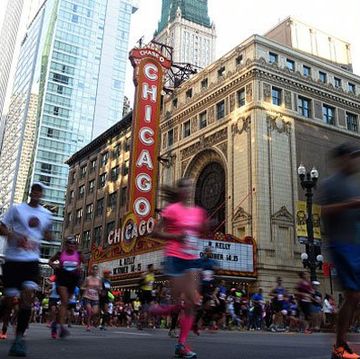A famous venue for supremely fast times, the Berlin Marathon is often dubbed as one of the fastest marathons on the planet – and the statistics prove it. Since its inaugural edition in 1974, eight men’s and five women’s marathon world records have been set at this iconic 26.2-mile race in the German capital.
One of the seven Abbott World Marathon Majors, the Berlin Marathon,which celebrated its 50th anniversary last year, boasts a wonderfully flat, spectator-lined route with wide roads that make overtaking easy. The weather conditions also tend to support PR performances, with the average race day temperature sitting at around 57°F.
If you’re one of the lucky ones getting ready to toe the start line of the 2025 race, here’s what you need to know about the event.
What is the Berlin Marathon?
Sponsored by BMW since 2011, the Berlin Marathon is among the most popular races of its kind, with runners from around 160 countries now taking part in the event each year. In fact, an incredible 54,280 participants completed the 50th edition of the race in 2024, making it the largest marathon in the world at that time. (This record is now held by the 2025 London Marathon, which had a staggering 56,640 finishers.)
The Berlin Marathon is also renowned for its speedy course, which has hosted more world records than any other marathon course in history. Ethiopia’s Tigist Assefa won the 2023 race in 2:11:53 to set the most recent women’s marathon world record in Berlin—a time that has only been surpassed once by Ruth Chepngetich, who won the 2024 Chicago Marathon in 2:09:56. (Chepngetich’s current world record is, however, now under suspicion.) The Berlin Marathon also holds the world’s second-fastest eligible men’s marathon world record of 2:01:09, which was clocked by Eliud Kipchoge in 2022. The late Kelvin Kiptum, who improved upon this mark with his 2:00:35 performance at the 2023 Chicago Marathon, is the only person to have run faster than Kipchoge.
When is the 2025 Berlin Marathon?
The 2025 Berlin Marathon will take place on Sunday 21 September.
What time does the Berlin Marathon start?
The elite hand bikers will kickstart proceedings and start the race first at 8:50 a.m. (Central European Time), before the elite wheelchair athletes set off shortly afterward at 8:56 a.m. The remaining hand bikers and wheelchair participants will then start at 8:59.
The first wave of runners will then get going at 9:15 a.m., followed by three subsequent waves of runners at 9:45 a.m., 10:10 a.m. and 10:40 a.m. If you’re running this year, you’ll find details of your wave allocation on your race bib—more on this below.
What is the Berlin Marathon route?
The route starts at the impressive Brandenburg Gate before passing through 10 of the city’s neighborhoods.
Around 10K into the race, you’ll pass the Reichstag building—the seat of the German parliament—in all its grandeur. You’ll then pass the Victory Column, which, standing 61 meters high, is topped with a bronze statue of Victory, the ancient Roman goddess. The column memorializes the victory of Prussia in three historical wars.
Around the 21 to 22 mile mark, you’ll then reach the Potsdamer Platz—a modern square filled with contemporary skyscrapers, offering a different perspective on Berlin’s multifaceted architecture.
The marathon concludes just past (not at!) the Brandenburg Gate, where the race also begins.
While the first half of the route is entirely flat, the second half sees a few gentle climbs with one steeper peak, although it’s nothing too significant—the Berlin Marathon is known for its flat course for a reason.
Where is the Berlin Marathon start line?
The race starts and finishes on Straße des 17 Juni, just beside the Brandenburg Gate. With more than 55,000 runners expected to take part, you won’t miss it.
The best way to get to the start line is by foot or public transport. Travel\ling by car should be avoided due to a lack of parking facilities.
If you’re a registered runner, you’ll be pleased to know that you can travel for free on public transport from Thursday 18 to Sunday 21 September—just make sure that you’re carrying a valid race bib with you.
The closest subways to the start line are Friedrichstraße (U6), which is a 12-minute walk away, and Potsdamer Platz (U2), which is just an eight-minute walk away.
The start area opens at 7 a.m. on race day.
Can you drop off a bag before the race?
You will be able to use the bag drop facility if you elected to do so, for a fee of €5, when registering for the race. In this instance, you’ll need to use the official bag given to you at the Berlin Marathon Expo and attach the correct baggage label—detailing your bib number—onto this.
If you didn’t choose the bag drop option when registering, you’ll receive a free poncho to keep you warm once you’ve crossed the finish line. (If you use the bag drop facility, you won’t receive a free poncho as well – it’s one or other other.)
How and where do you collect your race bib?
You’ll need to collect your race bib from the Berlin Marathon Expo, which— for the first time—will be located at Messe Berlin, South Entrance, Jafféstraße, 14055 Berlin. (If you’ve run the Berlin Marathon before, please take note of this new venue—you will not need to make the trek out to Tempelhof Airport.)
The 2025 Berlin Marathon Expo will be open at the following times:
- Thursday 18 September: 3 p.m.-8 p.m.
- Friday 19 September: 10 a.m.-8 p.m.
- Saturday 20 September: 9 a.m.-7 p.m.
Will there be nutrition and water on the course?
The race organizers encourage runners to bring their own hydration vests or drinking belts to carry water and fuel—see the website for specifications.
However, if you’d rather not carry your own, you will find water at the following kilometre marks along the course: 5, 12, 17.5, 22.5, 27.5, 32.5, 34.5, 38 and 40.
You will also find refreshment points offering tea, fruit and Maurten Drink Mix 160, as well as water, at these kilometre marks: 9, 15, 20, 25, 30 and 36.
Finally, Maurten Gel 100 will be available at the 27.5 km mark only.
Does the race have a cut-off time?
There is a time limit of six hours and 15 minutes, with a cut-off point of 3:50 p.m. at the 20 mile mark. The official finish time is 5:15 p.m. on race day—you won’t be able to cross the finish line after this point.
Can you defer your place if you’re injured?
Unfortunately, the Berlin Marathon doesn’t offer refunds or allow you to defer your place. There is, however, an exception in the case of pregnancy, which permits you to defer your place for up to three years with a medical certificate.
How can you gain entry into future Berlin Marathons?
Registration begins on September 21 and goes through early November. If you qualified with a fast time (details on the Berlin website), congrats! You’re guaranteed a bib. If you didn’t, you still have a shot at the lottery, which is less competitive than London but still increasingly popular given the historic, PR-friendly course.
Rachel is Runner's World UK's Senior Content Writer, covering all running-related topics from training advice and gear reviews to race reports and elite runner profiles. Formerly a Website Content Editor and Content Manager at London Marathon Events and The Running Channel respectively, Rachel is well-versed in the running scene and understands what it takes to put on some of the biggest running events in the world. A 2:50 marathoner, she would much rather run 26.2 miles than race a 5K and has currently completed 11 marathons, including five of the six Abbott World Marathon Majors in a sub-3 time. She now hopes to run the Tokyo Marathon to complete the set and become a Six Star Finisher.




















